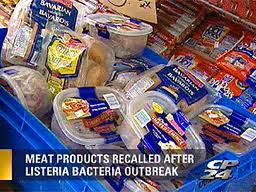A rash of Listeriosis cases in Canada has given rise to more public awareness of this illness. The recent presentation became manifest as a food borne illness, has been traced to one food processing company, and the facility is undergoing a thorough clean-up. Even though Listeriosis can present as a food borne illness, it is quite different from the contamination of foods with E. coli (“hamburger disease”) or food borne illness to salmonella contamination. The onset of illness in hamburger disease occurs rather quickly after the food has been ingested and can lead to a serious illness with kidney failure. Listeriosis, which is caused by the bacterium Listeria monocytogenes has a much longer incubation time, in some cases up to 70 days, and it can take much longer till it is detected. It can present like a febrile gastroenteritis (a stomach flu accompanied by a fever) in people who have a weakened immune system. A less common disease picture shows symptoms that look like influenza, but sometimes there can be shock and malfunction of the kidneys. In early pregnancy the infection with Listeriosis can lead to miscarriage, and late in pregnancy the result may either be stillbirth or sepsis in the newborn.
Even if the disease in the pregnant patient is mild, it will be almost always fatal for the child in the womb. If Listeria infection is suspected in the case of gastroenteritis, the laboratory should be notified, so the stool or blood specimens are kept and especially examined for Listeria. Foods that carried the bacterium and caused the illness were sandwich meats and ready made sandwiches. Consumers should inform themselves carefully, which food products were affected by recalls and also check packages for expiry dates.
More information on food safety: http://nethealthbook.com/health-nutrition-and-fitness/nutrition/food-safety/
Reference: CBC News and Cohen & Powderly: Infectious Diseases, 2nd ed. 2004 Mosby
Last edited November 5, 2014






